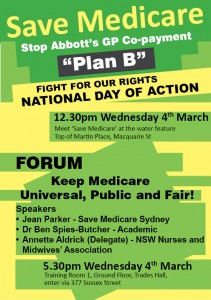A lengthy article by the Medical Journal of Australia casts very serious doubts on government claims, extracts follow:
… the unsustainability thesis is remarkably weak.
…The anomalous concern with the costs and not the benefits of an expanding health sector implies comparative lack of concern or confidence in the benefits despite evidence that better health is one of the diminishingly few ways in which we can improve the quality of life of the population.
….the country with the oldest population – Japan – spends little more than the OECD average on health. This illustrates a common error: the belief that …ageing necessarily drives health expenditures. Historically, this has not been true, as health expenditures have been driven by technology and the increasingly generous provision of health services as GDP rises.
……public health expenditures by all governments in Australia are the tenth lowest of the 33 countries in the OECD database and the lowest among wealthy countries in the group.
….Bulk-billing … The principle effect of its elimination will be a redistribution of income from this group (low income) to the healthier, wealthier members of the community.
…Copayments will, additionally, divert patients from lower-cost general practitioner care to higher-cost outpatient care. Those who defer needed treatment are likely to eventually need more expensive specialist care
Perversely, in the longer run, eliminating bulk-billing is likely to increase GP fees and expenditures by reducing competitive pressures.
…the low level of GP incomes — the lowest relative to average wages listed by the OECD after Estonia and Hungary. However, a more equitable remedy would be to increase, not decrease, the rebate.
external link MJA Can we sustain health spending
